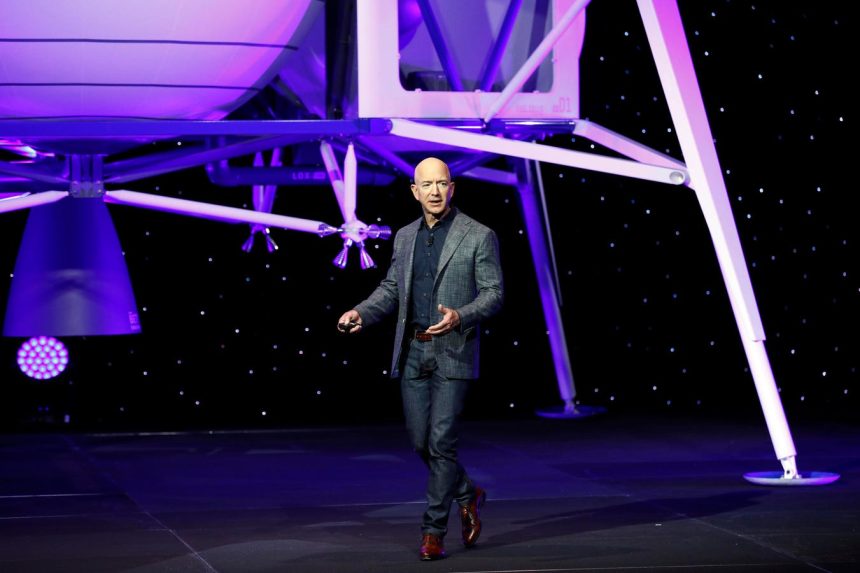Blue Origin, Jeff Bezos’ space venture, is poised to challenge SpaceX’s dominance in the American orbital launch market with its inaugural New Glenn rocket launch. After nearly 25 years of development, often marked by slower progress compared to Elon Musk’s SpaceX, Blue Origin’s heavy-lift rocket represents a significant shift in the landscape of the commercial space industry. This new competitor is welcomed by many in the industry and government who seek alternatives to SpaceX’s near-monopoly, fostering competition and potentially driving down launch costs. Blue Origin’s pricing strategy, offering double the payload capacity of SpaceX’s Falcon 9 for a proportionally lower price increase, has already attracted major satellite constellation companies seeking to deploy larger spacecraft in low-Earth orbit.
Blue Origin’s approach contrasts starkly with SpaceX’s “move fast and break things” philosophy. Embracing a “step by step, ferociously” motto, the company has methodically developed its capabilities, focusing on reusable rocket technology, engine development, and infrastructure for mass rocket production. While SpaceX rapidly increased its launch cadence over the past decade, capitalizing on delays and setbacks faced by established launch providers like United Launch Alliance and Arianespace, Blue Origin has been steadily building its foundation. The company’s New Shepard rocket, a suborbital vehicle for space tourism, has already demonstrated reusable first-stage landing capabilities, and its BE-4 engine powers the United Launch Alliance’s Vulcan rocket. Blue Origin’s substantial investment, estimated at $10 billion for the New Glenn program alone, largely funded by Bezos’ personal fortune, reflects a long-term vision for space exploration and commercialization.
The New Glenn rocket, with its larger payload capacity and competitive pricing, poses a direct challenge to SpaceX’s Falcon 9. This competition is particularly relevant for companies launching large constellations of satellites into low-Earth orbit, as the size and weight of these satellites continue to increase. Blue Origin has secured launch contracts with major constellation operators, including AST Mobile and, notably, Bezos’ own Amazon for its Project Kuiper satellite internet network. This reliance on Blue Origin for a substantial portion of Kuiper’s deployment underscores the strategic importance of New Glenn’s success for Bezos’ broader space ambitions. The US government, seeking greater flexibility and redundancy in its launch capabilities, has also awarded contracts to Blue Origin, further validating the company’s potential to become a major player in the space launch market.
The timing of New Glenn’s debut coincides with a potentially volatile political climate. Donald Trump’s return to the White House, coupled with his close relationship with Elon Musk, raises concerns about potential regulatory changes and government spending priorities that could favor SpaceX. The nomination of Jared Isaacman, a SpaceX investor and private spaceflight customer, to head NASA adds to these concerns, especially given Isaacman’s previous questioning of NASA’s funding for redundant lunar lander development programs involving both SpaceX and Blue Origin. While Bezos has expressed confidence that Musk will not leverage his political connections to unfairly benefit SpaceX, the potential for regulatory shifts and funding reallocations casts a shadow over the competitive landscape.
Despite the political uncertainties, Bezos remains committed to Blue Origin’s long-term vision, which extends far beyond the immediate competition with SpaceX. He envisions a future where space becomes a hub for manufacturing and resource extraction, ultimately transforming Earth into a primarily residential and light industrial zone. This ambitious vision hinges on significantly reducing the cost of accessing space, a goal that New Glenn is designed to advance. By offering greater payload capacity at competitive prices, Blue Origin aims to make space more accessible for a wider range of commercial and governmental activities, paving the way for the off-world economy Bezos envisions.
Blue Origin’s emergence as a serious contender in the space launch market signifies a new era of competition and innovation. While SpaceX’s early dominance has shaped the industry’s trajectory, the arrival of New Glenn offers alternative solutions and potentially lower costs for accessing space. This competition, coupled with the evolving political landscape and long-term ambitions of visionaries like Bezos, promises to accelerate the pace of space exploration and commercialization, potentially transforming humanity’s relationship with the cosmos. While challenges and uncertainties remain, the successful launch of New Glenn would be a pivotal moment for Blue Origin, validating its methodical approach and setting the stage for a more dynamic and competitive space industry in the years to come.



